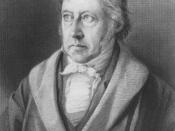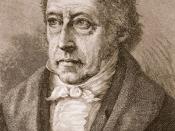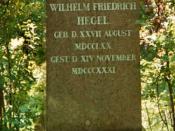Georg Wilhem Fredrick Hegel was born in August 27, 1770, in southwest Germany, in a town called Stuttgart. His father was a civil servant in the department of finance. He had one sister and a brother. Throughout growing up and studying, he was known as "the old man" because of his strict study habits. However, he was not considered an exceptionally gifted student. Hegel received his Master of Philosophy degree in 1790 and then started to study for his theological exam. In September of 1793, he passed his theological exam, but was too poor to take up parish work so he became a tutor. He hated tutoring in a house in Bern, Switzerland. However, the family did have a good library, which he used to advance his learning.
Human freedom is the central theme of modern political philosophy, and Hegel offers perhaps the most systematic modern attempt to understand the state as the realization of human freedom.
In this comprehensive examination of Hegel's philosophy of freedom, Paul Franco traces the development of Hegel's ideas of freedom, situates them within his general philosophical system, and relates them to the larger tradition of modern political philosophy. Franco then applies Hegel's understanding of liberty to certain problems in contemporary political theory. He argues that Hegel offers a powerful reformulation of liberalism that escapes many of the problematic assumptions of traditional liberal doctrine and yet avoids falling into the romantic and relativistic excesses of a substantial communitarianism.
Hegel's aim was to set forth a philosophical system to comprehensive that it would encompass the idea of his predecessors and create a conceptual framework in term of which both the past and future could be philosophically understood. Such an aim would require nothing short of a full account of reality itself. According to Hegel, the...



Hegel
You have written a good biography of one of the more famous German philosophers. I particularly liked the way that you provided headings within the essay to make it easier to read. Nice job!
10 out of 10 people found this comment useful.